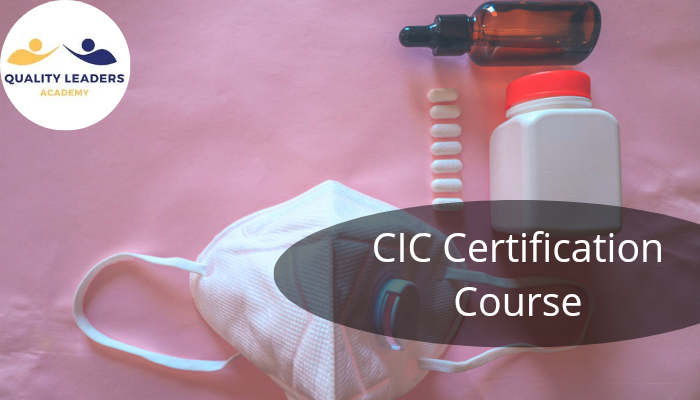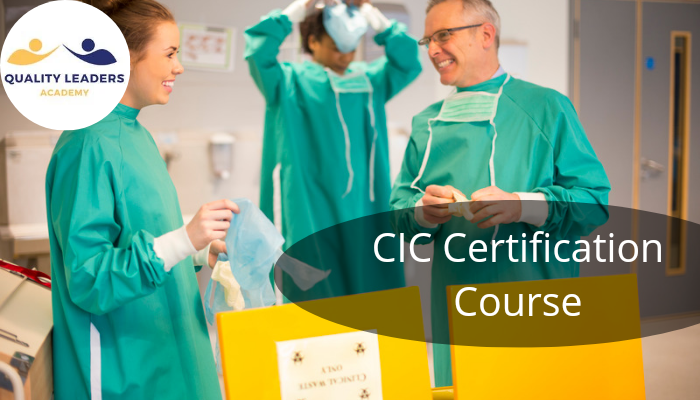The CIC certification course is designed for professionals aiming for excellence in infection prevention and control. Quality Leaders Academy offers a comprehensive CIC certification course that equips candidates with in-depth knowledge, practical guidance, and expert support to successfully prepare for the CIC exam, administered by the Certification Board of Infection Control and Epidemiology CIBC. In this article, we will provide a detailed guide on the CIC certification and how the Quality Leaders Academy can help you achieve your certification goals.
What is the CIC examination?

The CIC examination is a standardized assessment of the fundamental knowledge, skills, and abilities required of professionals working in infection prevention and control
The initial certification exam is an objective, multiple-choice test with 150 questions. 135 of these questions are utilized to calculate the score. Scroll down to "Practice Analysis" to learn more about the exam's writing process. Individuals can schedule their exams in a Prometric testing center or using Prometric's remote testing technology, ProProctorTM.
Benefits of Earning the CIC Designation
Here are some important benefits of obtaining the Certification in Infection Prevention and Control.
Improve your professional competence.
Certification represents an objective standard for verifying and acknowledging your infection prevention knowledge. Become a subject matter expert in infection prevention to increase your professional proficiency and exhibit your value as a member of the medical team.
Comply with regulatory obligations.
Certification in infection control will assist in ensuring that you meet regulatory standards for creating and maintaining a safe healthcare environment for patients. Following these guidelines to ensure patients' well-being is a primary goal of healthcare facilities. By earning skills and knowledge through certification, you may contribute to the main mission.
Advance in your career.
Becoming certified in infection control may allow you to develop in your profession. When applying for jobs, highlight your certification to demonstrate your expertise and competency in the subject. Certification may also help you advance to a higher position in the medical industry.
Stay up-to-date on best practices
As new knowledge about how infections develop and spread emerges, certification can keep you up to date on the latest preventive and treatment strategies. Going through the certification process helps you to learn the most recent knowledge on research and innovation. It can help you discover new ideas and demonstrate your understanding of implementation strategies.
What are the main Guidelines for CIC Initial Certification?
Successful CIC certification demonstrates competency in infection prevention and control, as well as healthcare epidemiology.
It is meant for people who are directly responsible for infection prevention and control program actions in their current role. It is advised that candidates be actively employed and responsible for infection prevention and control.
What are the requirements to be CIC certified candidate?
Candidates are recommended to have:
- Completed post-secondary education in a health-related discipline, such as medicine, nursing, laboratory technology, public health, or biology. Universities, colleges, community colleges, and other post-secondary institutions may be public or private.
- Direct responsibility for infection prevention and control programs/activities in a healthcare context, as stated in your current job description.
- Work experience, defined as active engagement in infection prevention, as assessed by a current job description, for compensation, for at least
- Requirements:
- At least one year of full-time employment.
- Two years of part-time employment.
- Completed 3,000 hours of infection prevention job experience during the past three (3) years.
Who can obtain the CIC certification?
Here are seven distinct jobs where people may consider acquiring the CIC accreditation:
1. Epidemiologist.
An epidemiologist is responsible for investigating the causes and transmission of disease. They research and collect data, then report it to doctors and policymakers. They may also contribute to the development of tools for identifying, understanding, containing, and preventing the spread of illnesses.
2. Public Health Nurse
A public health nurse is an RN who specializes in public health. They promote public health and illness prevention, as well as increasing underserved groups' access to health care.
3. Hospital Manager
A hospital manager is responsible for the day-to-day operations of essential hospital services that influence medical professionals and employees, such as infection control and prevention. Hospital managers are responsible for budgeting and planning, policymaking, marketing, and patient care operations.
4. Infection Preventionist
An infection preventionist is in charge of collecting, understanding, disseminating, and applying infection prevention data. They utilize this information to help reduce the spread of illnesses in healthcare environments. Infection preventionists frequently have a nursing background or have worked in other medical fields.
5. Research Scientist
A research scientist in the medical profession develops, designs, and performs scientific investigations. They work to discover, explain, and create treatments for infectious diseases and other medical disorders.
6. Infection Control Nurse
An infection control nurse is an RN who treats patients with infectious disorders. They may also help develop and implement best practices for infection control and prevention in healthcare institutions.
7. Infectious Disease Physician
An infectious disease physician is a medical doctor who focuses on the prevention and treatment of transmissible diseases. These doctors diagnose infectious disorders, recommend treatment options, and provide post-infection rehabilitation to patients in recovery.
Here are additional specifications for individuals who can obtain the CIC certificate:
- Scientist (chemist/Microbiologist).
- Pharmacist.
- Laboratory technologist.
Importance of CIC certification course

The CIC certification course is an essential resource for those preparing to pass the Certification in Infection Control (CIC) exam. It provides a structured learning path that covers key topics such as infection prevention practices, epidemiology, microbiology, and risk assessment. Through focused study materials, practice tests, and expert guidance, the course helps candidates strengthen their understanding of infection control principles and enhances their ability to apply this knowledge in real-life scenarios. By completing the CIC certification course, candidates gain the confidence and competence needed to tackle the exam successfully, significantly increasing their chances of achieving certification.
In conclusion, the CIC certification course plays a pivotal role in helping candidates successfully pass the CIC exam and advance in their careers in infection control. By providing comprehensive learning materials, expert insights, and practical exam preparation, the course equips individuals with the knowledge and skills needed to excel in infection prevention. Whether you're a healthcare professional looking to specialize in infection control or seeking to strengthen your credentials, the CIC certification course is a valuable step toward achieving your certification and enhancing your expertise in this critical area of healthcare.
Read also:
CPHQ certification eligibility
References:
https://www.cbic.org/CBIC/Candidate-Handbook/Eligibility-Guidelines.htm
https://www.cbic.org/CBIC/CIC-Certification/About-the-Examination.htm
https://www.aapc.com/certifications/cic/prepare-for-the-cic-exam


